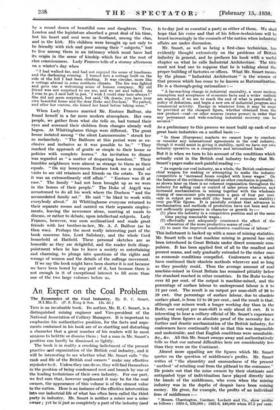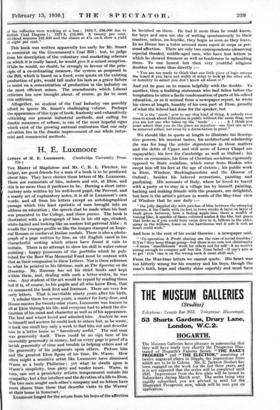An Expert on the Coal Problem
Tms is an invaluable book. Its author, Mr. R. C. Smart, is a distinguished mining engineer and Vice-president of the National Association of Colliery Managers. It is important to emphasize his authoritative position, for the facts and argu- ments contained in his book are of so startling and disturbing a character that a great number of his readers will be most anxious to belittle or dismiss them ; but a man in Mr. Smart's position can hardly be dismissed so lightly.
The book is in reality a crushing indictment of the present practice and organization of the British coal industry, and it Will be interesting to see whether- what Mr. Smart calls " the rank and -file of the British coal owners" make any effective rejoinder to it. Unless they can do so, they will find themselves in the position of being condemned root and branch by one of the leading technicians of their own industry. For our part, • we feel sure that, however unpleasant it may be for the coal owners, the 'appearance of this volume is of the utmost value: to the nation. Here is an instance of the effective intervention into our industrial life of what has often been called the third= party in industry. Mr. Smart is neither a miner nor a mine; owner ; yet he is just as completely a part of the industry (and; is to-day just as essential a part) as either of them. We shall hope that his voice and that of his fellow-technicians will be heard increasingly in the counsels of the nation when industrial affairs are under discussion.
Mr. Smart, as well as being a first-class technician, has evidently thought extensively on the problems of British
inauitry in general, and he prefaces his book with a useful chaPter on what he cilis, Induatrial Architecture. The title must not lead one to suppose that he is talking abOut the proper building of factories or' ffices. What Mr. Smart means by the phrase " Industrial Architecture " is the science of that process which has dome to be known as Rationalization.
He is a thorough-going rationalizer
" A far-reaching change in in' duatrial mentality, a more modern conception and accePtance of economic facts and a wider outlook are required, if we are to reach the end of what is practically a policy of defeatism, and begin a new era of industrial progarS and commercial activity. Energy in whatever form it may be must be provided at the cheapest figure, whether obtained from the raw product—coal—or other sources (water power) in order that any permanent and wide-reaching industrial recovery can be secured?'
As a preliminary to this process we must build up each•of our great basic industries on a unified basis :— " In these (European) markets we cannot hope to conclude or consider any international agreements in the coal industry, though it would assist in giving it stability, until we have our own industry operative on a competitive and rationalized basis."
But it is when we turn to his account of the conditions which actually exist in the British coal industry to-day that Mr. Smart's pages make such painful reading :—
" As regards our coal industry, as a whole, the British coalowners' chief weapon for making or attempting to make the industry competitive is ' increased hours coupled with lower wages.' On the balance of the evidence obtained no other conclusion is possible ; as shown later on there is no coherent organisation throughout the industry for selling coal or control of sales prices whatever, and increased mechanization in mining together with the wholesale closing of uneconomic pits represents a gain of four per cent. only in output per man-shift (the basis of economic stability) over pre-War figures. It is painfully evident that advances in mechanization and methods of production have not been and are not sufficiently progressive in character or growth to :—
(1) place the industry in a competitive position and at the same time paying reasonable wages ; (2) effectually and adequately counteract the effect of the exhaustion of the more productive seams of coal ; (3) to meet the improved ameliorative conditions of labour."
This indictment is baeked up with a mass of Mining statistics. Mr. Smart tells us that machine mining in general has only been introduced in Great Britain under direct economic com- pulsion. It has been applied first of all to the smallest and poorest seams, and only gradually extended to the richer ones as economic conditions compelled. Coalowners as a whole have continued their obsolete methods wherever and so long as they possibly could. Thus the average amount of coat machine-mined in Great Britain has remained pitiably below the standard reached in other countries. In the Ruhr to-day over 85 per cent. of the output is machine-mined, and the percentage of surface labour to underground labour is 8 to
12 per cent. The result is an output per man-shift of 26 to
29 cwt. Our percentage of surface labour, due to obsolete surface plant, is from 12 to 26 per cent., and the result is that, although our miners work a longer working day than in the Ruhr, our output per man-shift is only about 21 cwt. It is interesting to hear a colliery official of Mr. Smart's experience quoting these figures as absolute proof of the necessity for a further and drastic mechanization of the British industry, for coalowners have continually told us that this was impossible and undesirable, and that English conditions were unsuitable, &c., &c. All this Mr. Smart sweeps away and authoritatively tells us that our natural difficulties here are considerably less than they were on the Continent.
AlmOst more appalling are the figures which Mr. Smart quotes on the question of middlemen's profits. Mr. Smart writes of " the absurdity and unsoundness of the present ' method' of retailing coal from the pithead to the consumer.", He points out that the mine owners by their obstinate and antiquated type of individualism have played directly into the hands of the middlemen, who even when the mining industry was in the depths of despair have been coining money. He gives, for example, the profits of an individual firm of middlemen :-
"Messrs. Charrington, Gardner, Lockett and Co., show profits as follows : 1924-5, £50,000 ; 1925-6, £40,000 when 67Z per cent.
of the collieries were working at a loss ; 1926-7, £96,000 due to
British Coal Dispute 1927-8, £55,000. A twenty per cent. dividend requires £42,400 and the shares at 475. each show a yield of eight per cent."
This book was written apparently too early for Mr. Smart to comment on the Government's Coal Bill ; but, to judge
from his description of the voluntary coal marketing schemes on which it is really based, he would give it a mixed reception. While he would, no doubt, be strongly in favour of the prin- ciple of a co-ordinating measure, the system as proposed in the Bill, which is based on a fixed, even quota on the existing production of pits, would fall under his lash as a grave failure to insist on a concentration of production in the industry on the most efficient mines. The amendments which Liberal criticism has now brought about, of course, go far to meet this criticism.
Altogether, no student of the Coal Industry can possibly, afford to ignore Mr. Smart's challenging volume. Perhaps' the appearance of this type of book, fearlessly and exhaustively
criticizing our present industrial methods, and calling for drastic measures of reform, is one of the most hopeful signs which exist of the growing national realization that our only salvation lies in the drastic improvement of our whole indus trial and commercial methods.











































 Previous page
Previous page